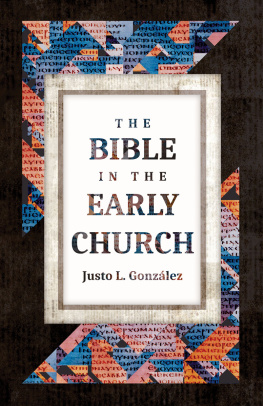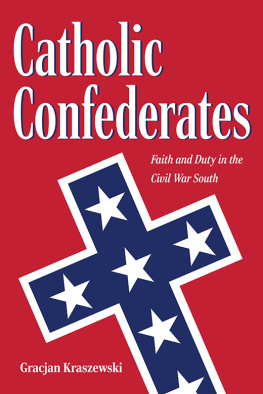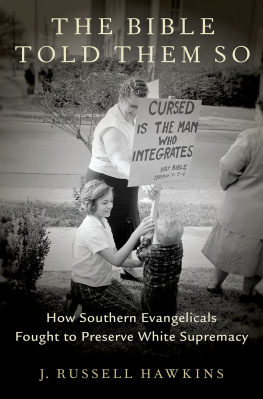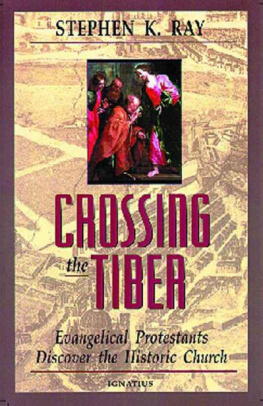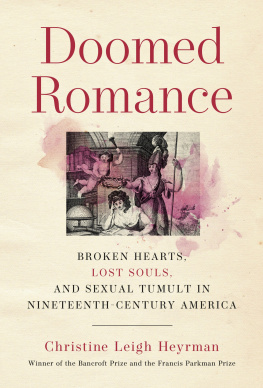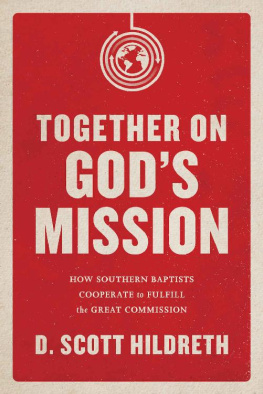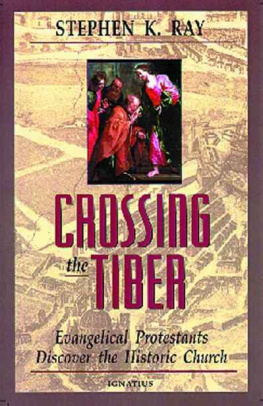Heyrman - Southern cross : the beginnings of the bible belt
Here you can read online Heyrman - Southern cross : the beginnings of the bible belt full text of the book (entire story) in english for free. Download pdf and epub, get meaning, cover and reviews about this ebook. City: New York, year: 1998, publisher: Knopf Doubleday Publishing Group, genre: Romance novel. Description of the work, (preface) as well as reviews are available. Best literature library LitArk.com created for fans of good reading and offers a wide selection of genres:
Romance novel
Science fiction
Adventure
Detective
Science
History
Home and family
Prose
Art
Politics
Computer
Non-fiction
Religion
Business
Children
Humor
Choose a favorite category and find really read worthwhile books. Enjoy immersion in the world of imagination, feel the emotions of the characters or learn something new for yourself, make an fascinating discovery.

- Book:Southern cross : the beginnings of the bible belt
- Author:
- Publisher:Knopf Doubleday Publishing Group
- Genre:
- Year:1998
- City:New York
- Rating:4 / 5
- Favourites:Add to favourites
- Your mark:
- 80
- 1
- 2
- 3
- 4
- 5
Southern cross : the beginnings of the bible belt: summary, description and annotation
We offer to read an annotation, description, summary or preface (depends on what the author of the book "Southern cross : the beginnings of the bible belt" wrote himself). If you haven't found the necessary information about the book — write in the comments, we will try to find it.
Heyrman: author's other books
Who wrote Southern cross : the beginnings of the bible belt? Find out the surname, the name of the author of the book and a list of all author's works by series.
Southern cross : the beginnings of the bible belt — read online for free the complete book (whole text) full work
Below is the text of the book, divided by pages. System saving the place of the last page read, allows you to conveniently read the book "Southern cross : the beginnings of the bible belt" online for free, without having to search again every time where you left off. Put a bookmark, and you can go to the page where you finished reading at any time.
Font size:
Interval:
Bookmark:
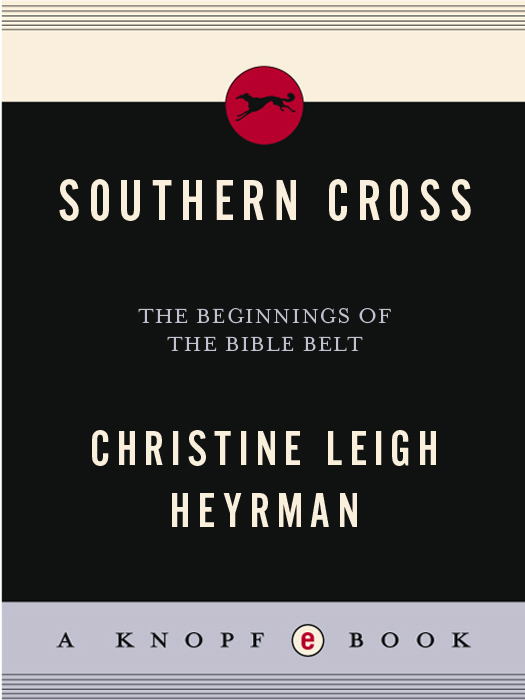
ALSO BY
CHRISTINE LEIGH HEYRMAN
Commerce and Culture: The Maritime Communities of Colonial Massachusetts, 16901750
Nation of Nations: A Narrative History of the American Republic (with four coauthors)
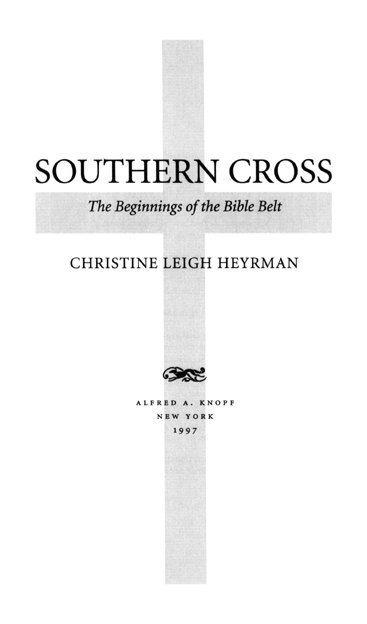
THIS IS A BORZOI BOOK
PUBLISHED BY ALFRED A. KNOPF, INC.
Copyright 1997 by Christine Leigh Heyrman
All rights reserved under International and Pan-American Copyright Conventions. Published in the United States by Alfred A. Knopf, Inc., New York, and simultaneously in Canada by Random House of Canada Limited, Toronto. Distributed by Random House, Inc., New York.
http://www.randomhouse.com/
Library of Congress Cataloging-in-Publication Data
Heyrman. Christine Leigh.
Southern cross: the beginnings of the Bible
Belt / Christine Leigh Heyrman.1st ed.
p. cm.
eISBN: 978-0-307-82973-3
1. Southern StatesChurch history. 2. Evangelicalism
Southern StatesHistory. I. Title.
BR535.H47 1997
277.5081dc21 976354
v3.1
To Thomas Calvin Carter
Eudora Welty described her beginnings as a writer by recalling that Daydreaming started me on my way, but story writing, once I was truly in its grip, took me and shook me awake. On a good day, I can see myself somewhere in the middle of that processhappily imagining that story writing is taking hold of me; on a bad day, I feel myself slipping from its grasp. But always, I am sustained and challenged by three friendshistorians by trade, story-tellers by some higher callingwhose way with the past rouses those in the present to wonder and reflect. First among them is Edmund Morgan, who has squandered many hours over the last twenty-five years teaching me almost everything that I know and much more that Im still trying to learn. Then there is James West Davidson, who encourages me to keep trying, even while pretending that hes doing nothing of the sort. And there is Richard Godbeer: some years ago I tried to teach him, and ever since he has been retaliating. All three would be embarrassed by any fuller praise of the many ways in which my work has benefited from their formidable knowledge, inimitable grace, offhand generosity, and lethal wit.
Before beginning the research for this book, I had worked only on early New England, so it took some doing to find my way into the South. Those who especially helped me to make that change are Michael Johnson, who warned me against assuming that evangelicalism won acceptance among southerners as readily as it did among Yankees, and Rachel Klein, who encouraged me to cast this book as a study of the entire South rather than focusing on a particular state or community. A great many other specialists in southern history shared their expertise on matters that ranged from where to find what in the archives to the best ways of seasoning grits, for all of which I thank Lacy Ford, Stephanie McCurry, Patricia Montgomery, Miles Richards, and Fredrika Teute. I am also indebted to Allen Stokes and Herbert Hartsook at the South Caroliniana Library, and to John Brunswick and David Langenberg at the Morris Library of the University of Delaware, as well as to the many other professional librarians who helped me to track down both manuscript collections and obscure printed sources at the Perkins Library of Duke University; the Regenstein Library at the University of Chicago; the Southern Historical Collection at the University of North Carolina, Chapel Hill; the Virginia Baptist Historical Society at the University of Richmond; and the Virginia State Historical Society.
I figured out what this book was about at the National Humanities Center, a sylvan mecca where an impeccably professional staff headed by their director, W. Robert Connor, treats every scholar like a treasure. After a year of being spoiled there as a fellow, I eagerly returned for three summers as an instructor of seminars for high school teachers on American religious history, organized by Richard Schramm, Carolyn Jackson, and Crystal Waters and funded mainly by the National Endowment for the Humanities. During our long morning classes and informal sessions after lunch, I learned more than I taught, from both the participants and my fellow instructorsRandall Balmer, Grant Wacker, and, most particularly, Donald Scott, a wonderful teacher and an ideal critic.
As it happened, these summer seminars fell during the years in which I was working research notes into chapters. For much of that time I was able to devote myself to writing, thanks to grants from the American Council of Learned Societies and the John Simon Guggenheim Foundation; I also benefited from the semester at the Shelby Cullom Davis Center at Princeton University, to say nothing of the kindness of its then-director, Natalie Zemon Davis, and her assistant, Kari Hoover. And I am most particularly indebted to my colleagues at the University of Delaware, David Pong, the chair of the History Department, and Mary Richards, the dean of the School of Humanities, who arranged for both sabbatical leave and additional financial support.
I have been equally fortunate in those people who encouraged me by commenting so knowledgeably on various chapters in progress. That long list includes Steven Aron, Richard Beeman, Michael Bellesiles, Ira Berlin, Anne Boylan, Betsy Brown, Peter Brown, Jon Butler, Catherine Clinton, Drew Gilpin Faust, Emily Grosholz, Dirk Hartog, James Henretta, Bernard Herman, Peter Kolchin, Bruce Mann, John Murrin, Alison Olson, Harold Selesky, Neva Specht, Steven Spector, Sean Wilentz, and Michael Zuckerman. Jane Garrett, my editor at Knopf, helped me to complete this book with her irresistible mixture of savvy advice, uncommon sense, and offbeat jokes, while my copy-editors, Sarajane Herman and Melvin Rosenthal, alerted me with superhuman tact to many sins against the English language.
That leaves only those people who make it easy for me to write and easier still to stop. My parents, Robert Heyrman and Verona Monfils Heyrman, made a point of never asking me when this book would be finished, while my sister, Anne Hart, quite credibly feigned interest in my southern evangelicals, claiming to find them almost as fascinating as her Hellenistic Jews and early Christians. I have been as generously indulged by Richard Carter, my brother-in-law, and my niece and most beguiling muse, Rachel Elizabeth Speer, both of whom drew on their command of the Bible to help me locate some of the passages that open these chapters. Meanwhile, my friend Lisa Keamy showed her loyalty by refusing to humor me in any waythe perfect tonic for instilling in others some measure of her own courage and confidence. Finally, there is my husband, Tom Carter, who likes to claim that he contributed to this book merely by correcting my spelling through several drafts. We both know better. Our life together is what I long dreamt of being awakened to, so this book is for him.
CANAANS LANGUAGE
Behold, the Lord is riding on a swift cloud and comes to Egypt; and the idols of Egypt will tremble at his presence, and the heart of the Egyptians will melt within them.
In that day, there will be five cities in the land of Egypt which will speak the language of Canaan and swear allegiance to the Lord of hosts. One of these will be called the City of the Sun.
ISAIAH 19:1, 18
M ARY M AC D ONALD raised her children to fear the Lord. The mistress of a large plantation in the South Carolina low country, she nurtured the fledgling souls committed to her care with a daily regimen of family prayer and Bible readings, moral admonition and spiritual advice. Even when her children left home to attend school or visit relatives, she kept up her oversight of their spiritual progress in long letters. In 1814 she pressed Sweet little Catherine, then a twelve-year-old schoolgirl, to consider what will you do when death comes and cuts your body, this proud and haughty body, down to be consigned to the tomb, there to be food for worms,it is so vile and sinful it deserves no better, but what will become of your immortal part, the soul cannot die, it must ascend to God to receive its doom. True, Catherine was still more child than woman, but not too young, in her mothers view, to be warned that death stalked life, and that judgment would be as swift as hell was terrible, for if you are not united to Christ infernal fiends will stand ready to drag you down to outer darkness no hope of release, torments eternal. To avert so awful a fate there could be only one recourse: Come then, my dear, she implored the girl, believe in Jesus, go to him and say, Thy word teacheth me that I am a lost undone creature by nature and I have added and made myself more vile by practice.
Font size:
Interval:
Bookmark:
Similar books «Southern cross : the beginnings of the bible belt»
Look at similar books to Southern cross : the beginnings of the bible belt. We have selected literature similar in name and meaning in the hope of providing readers with more options to find new, interesting, not yet read works.
Discussion, reviews of the book Southern cross : the beginnings of the bible belt and just readers' own opinions. Leave your comments, write what you think about the work, its meaning or the main characters. Specify what exactly you liked and what you didn't like, and why you think so.

